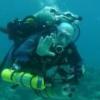We enacted a shop policy where divemaster candidates and dive professionals and not allowed to assist with a specialty course they do not personally hold certification in. This minimized potential issues, because in those situations aren't they really just the same as your other students? Take for example, a DM assisting with a cavern course who has never been in cavern!! While we don't have caverns here, for me it is our Deep diving course. In the PNW, diving beyond 100' is pitch black and cold with inhibited visibility (you can see well at depth horizontally, but not vertically where you can see the surface thus stunting depth orientation).
So along these lines, I also believe there are other courses every dive professional should hold, beyond the basics. One such course is simply local Fish ID. There is nothing worse than listening to a dive professional either brief a site or answering questions about the critters the diver saw and that instructor either has NO clue or gives horribly inaccurate info. Yeah yeah we are here to teach people to dive safely, but what is the purpose of diving? Most often the number one reason is to see stuff!! Perhaps in Florida, it would be basic cavern in place of Fish ID, and Ice Diving in Idaho, but you get my point.
So, while I agree with Peter regarding EANx, I do so because as I noted above, it is a part of our dive shop culture and routine. It is also is simply prudent when working with many students where dive professionals make many ascents. Another such basic course in our area that affects dive planning is Altitude. It is a basic course. So when are all you dive professionals coming for a visit so you can add this to your repertoire? We’ll hit Clear Lake – bring your fleece.
Diving in caverns, however, is not routine for our area. So for me, while I get the concepts, I do not feel it necessary or prudent that I must hold that experience to be considered well rounded (mind you as an active dive nut, I do have cavern and cave experience – but that was for personal diving and not because I thought I needed to as a dive professional). When a diver of mine is interested in such diving, I send them to a cavern/cave qualified instructor. If I try to be the Jack of all Trades dive professional, I believe dilution can occur. Instead of offering a selection of solid courses that are well suited for the areas I dive in or those that are feasible to teach and are prevelant (such as EANx), I could instead be certified to offer all courses and do a poor job in each? No thanks.
I do, however, feel a great responsibility as an instructor to have mastery in many areas and to be knowledgeable in many areas including keep apprised of new advents in the diving industry. One of my favorite ways of staying up on things, is participating in community forums such as SD.
So I guess in many ways, I am in agreement with most all of you, but in separate settings.

















